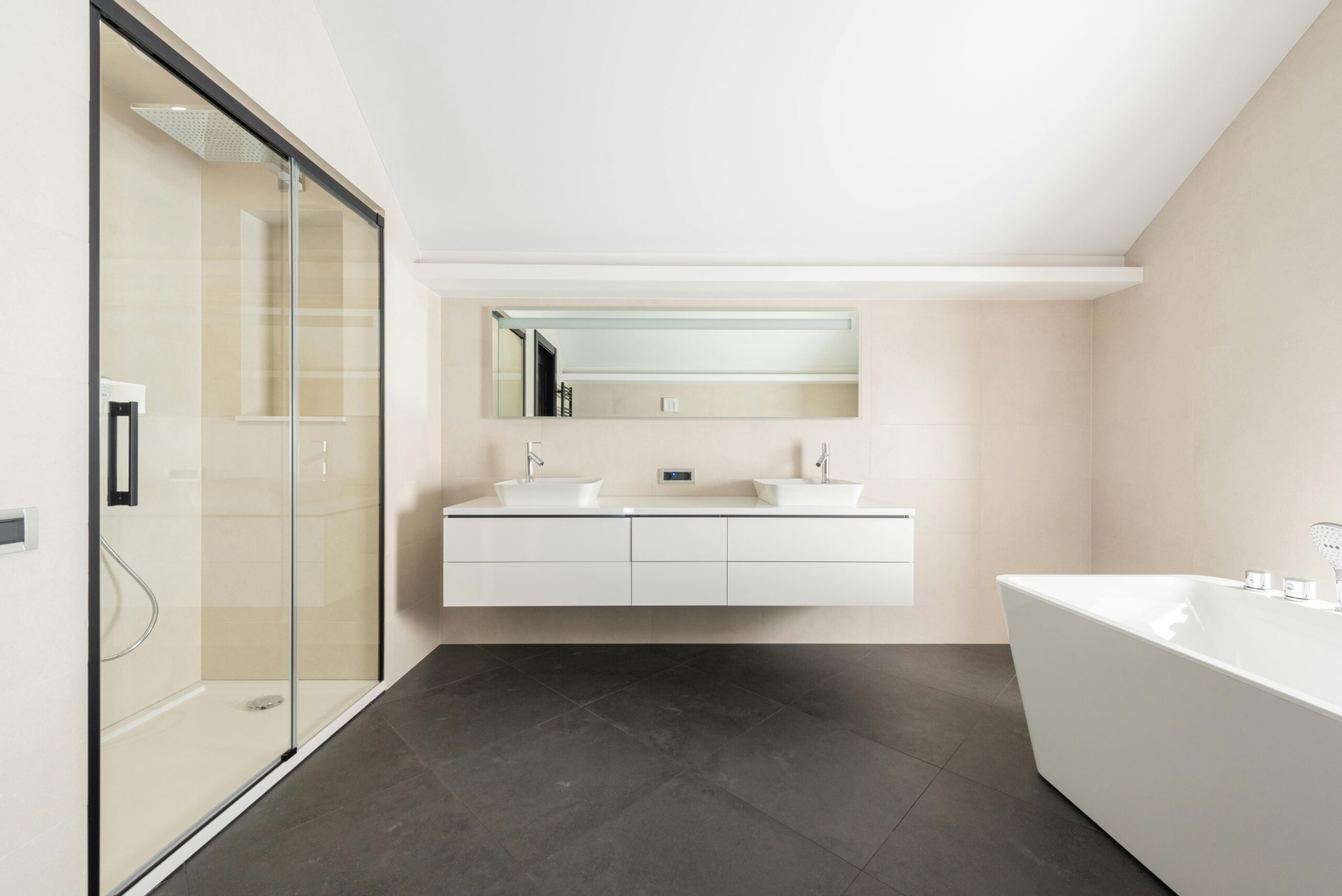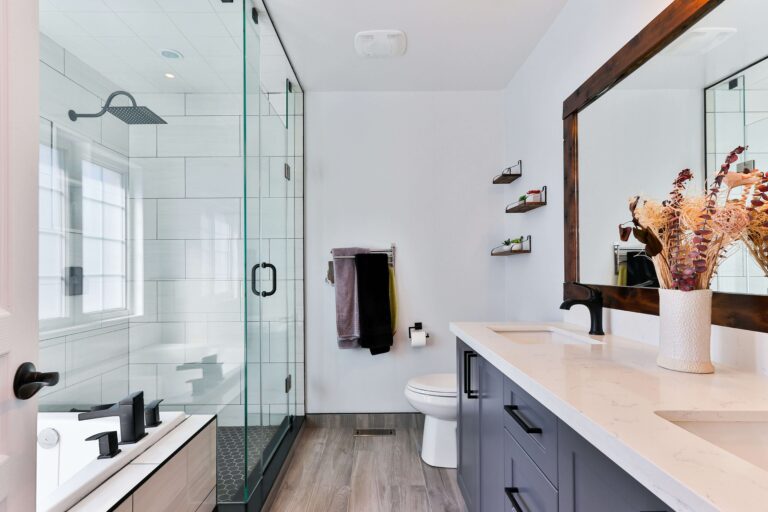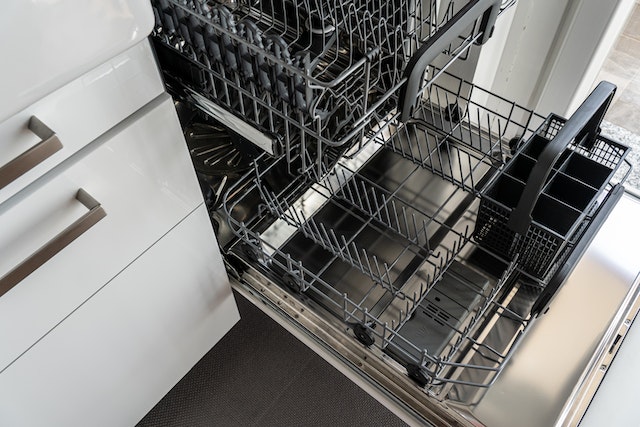The flooring is one of the most important things to consider when planning a bathroom remodel. Bathrooms require moisture-resistant waterproof flooring that stands up well to frequent wear and tear. Some bathroom flooring materials are ideal for your remodel, whereas others should be avoided. Working with a professional is one of the best ways to select the right option for your household. This guide also reviews a few excellent bathroom flooring ideas you can implement into your design plans.
Bathroom Flooring Ideas to Avoid
While there are a lot of excellent flooring materials to consider, some are best avoided. The right bathroom flooring should be highly durable, slip-resistant, and waterproof, making the following options less than ideal.
Carpet
Carpet and bathrooms don’t mix. While carpet may be the softest and most comfortable flooring, it isn’t suitable for wet environments. Carpeting in the bathroom or powder room is a thing of the past, and for good reason.
It’s not water resistant, you can’t properly clean or remove water, and accumulated water could eventually damage your bathroom’s subfloor. Carpet also harbors bacteria, which are frequently present in the bathroom.
Hardwood
As restoration and renovation specialists, we cannot recommend hardwood bathroom floors. Wood is prone to water damage, and to be suitable for a bathroom, it would have to be perfectly sealed. Hardwood bathroom designs also require a lot of upkeep and maintenance, and failing to keep up could lead to expensive damages and poor air quality.
If you’re insistent on hardwood floors in the bathroom, it’s crucial that you work with a professional. You’ll need high-quality engineered wood materials with an extremely secure installation to avoid moisture gaps.
Laminate
Laminate is another flooring option that’s not ideal for the bathroom. Like hardwood, laminate flooring needs to be completely sealed. Failure to clean up any spills quickly allows water to penetrate lower floor levels, sometimes leading to mildew or mold where you can’t see it. Eventually, water and moisture can cause the laminate floor to bubble or warp.
Best Bathroom Flooring Options
Carpet, hardwood, and laminate flooring may not be the best for remodeling your home’s bathroom. These materials, however, are all excellent, durable options.
Stained Concrete
You won’t find stained concrete as frequently in today’s bathrooms. However, concrete can be an extremely durable, resistant bathroom floor choice when painted or stained. A concrete foundation floor also gives off an industrial, contemporary design that few other bathroom flooring options achieve. Concrete floors are an excellent option when you want to create a consistent floor design that flows from the rest of the bathroom into a walk-in shower.
While concrete lasts a long time once poured, it’s crucial that it’s perfectly installed in the first place. Concrete also tends to be very cold to the touch but will never be damaged by standing water. Homeowners can overcome the potential downsides of a concrete floor by adding large, soft rugs or insulation. Rigid foam insulation placed underneath the concrete can make it slightly warmer to the touch.
Natural Stone
Natural stone is the best bathroom flooring if you’re going for a more luxurious design. Homeowners today have many options for natural stone tiles, including granite, slate, marble, or quartz. This also means you have many color and design options when using natural stone flooring. Larger tiles in granite can boost your home’s resale value. Smaller tiles made of slate instantly give a half bathroom a richer design.
Of course, as with any bathroom flooring option, natural stone has a few downsides. Stone tiles are one of the most expensive bathroom flooring options, but they also last long. Natural stone tile is also prone to being slippery.
Textured natural stone options can help minimize the slipperiness. Natural stone is also prone to scratches and dings, so it may not be the best flooring option for high-traffic bathroom floors. Additionally, one of the biggest downsides of natural stone tile is that it must be installed correctly and often requires the services of a professional.
Ceramic or Porcelain
Ceramic or porcelain is one of the most popular bathroom floor choices for several reasons. Ceramic tiles come in various designs, sizes, and styles, making it easy to create your dream bathroom. You can choose different tile flooring sizes and shapes, making it a versatile floor material.
Large tiles look excellent in bathrooms with more space, but smaller tiles look just as great in a smaller bathroom. Porcelain tiles are also waterproof, but they sometimes require sealant to ensure they stand up to the bathroom’s continually wet conditions. The smooth texture of porcelain and ceramic tiles also makes them easy to clean.
The biggest downside to ceramic or porcelain tile is that it can get slippery when wet, especially with a sealant. Ceramic tiles will also feel cold, so you may need to add a non-slip bathroom mat outside the shower or bathtub. While ceramic tiles hold up well to heavy wear and tear, they may require professional installation.
A few key differences exist when choosing between ceramic and porcelain tiles. Porcelain tile is slightly denser than ceramic tile, which means it may be less durable and more prone to cracks than ceramic tile. Porcelain tile should also almost always be installed by a professional. However, with professional installation and proper maintenance, porcelain and ceramic tile can last between 75 and 100 years.
Vinyl
Vinyl is a popular bathroom floor material because it’s cost-effective and easy to install. Homeowners can also purchase waterproof vinyl in different designs, some of which even resemble wood or tile. Those wanting a more upscale design while staying on budget can also use luxury vinyl flooring (LVT). This waterproof, durable material looks similar to your other favorite bathroom flooring but is more water-resistant and easier to work with.
Most people find vinyl flooring very easy to install. Vinyl plank flooring comes in large, long pieces that fit together well. Sheet vinyl flooring is even easier to install since it’s one single piece of bathroom flooring.
In addition to being completely waterproof and budget-friendly, replacing vinyl can be cost-effective if damage occurs, but doing so may require pulling out the whole floor. Another consideration of vinyl flooring is that while it’s warmer than porcelain or ceramic tile, it tends to show more visible wear and tear.
Cork
If you want an eco-friendly bathroom, you might consider cork flooring. Cork materials and other sustainable flooring options are becoming increasingly popular in today’s home designs. Also, cork is a very affordable material, and it’s surprisingly easy to work with. Unlike tile flooring, it’s more resistant to becoming slippery and isn’t as cold as other options.
The biggest downside of cork flooring is that it’s porous, so you’ll have to add a polyurethane sealant to it to prevent moisture and mildew. You can also add an absorbent bath mat when using a cork bathroom floor.
Marble
For the ultimate upscale bathroom design, marble materials are the way to go. Marble is a type of natural stone, meaning it’s waterproof, wear and tear-resistant, and available in many beautiful designs. Matching your marble bathroom floor to a marble countertop creates a consistent design that gives your home an upscale appearance. You can even use marble materials for your shower tile and ceiling.
Marble may give off a luxurious finish but also requires prior sealing to prevent mildew. Marble floors can also be cold, but adding radiant heating overcomes that. Because marble is considered an upscale design, you can expect it to come with a higher price tag. It also requires much maintenance and upkeep to keep it in excellent condition.
Limestone
Limestone is another excellent natural stone flooring option. It’s highly resistant to staining and scratches, making it well-suited for the bathroom. Many people enjoy limestone, too, because it’s easy to clean. You can use a simple mop or cloth to wipe up spills quickly. Some homeowners may use the same limestone in other household rooms for a consistent flow.
Limestone doesn’t come without downsides. Like other natural stone floors, it requires careful maintenance, and since it’s very porous, it requires a new application of sealant every three to four years. Ongoing upkeep needs and the initial price can make limestone an expensive bathroom flooring option. Finally, limestone should always be installed by a professional so it retains its moisture-resistant properties.
Bathroom Floors FAQs
What is the easiest bathroom floor to clean?
The easiest bathroom floor material to clean is vinyl or linoleum. Otherwise, smooth, large title textures are easier to clean than smaller tiles with many grooves or cuts. If your interior design plans include a textured floor, you’ll need a good sealant to assist with cleaning.
What is the least slippery flooring in the bathroom?
The least slippery flooring in the bathroom is non-slip vinyl flooring. Natural stone is another excellent non-slip flooring option for the bathroom if you have a larger budget. Cement or concrete are a few more slip-resistant flooring options.
Which bathroom flooring lasts the longest?
Porcelain or ceramic tiles last the longest, sometimes as long as 75 to 100 years. When installed correctly, this bathroom flooring is highly durable and can last many years despite frequent wear and tear. Ceramic tile also requires minimal maintenance, making it an excellent investment. Of course, professional installation of any bathroom flooring increases its lifespan, helping you get more value for your budget.
What type of flooring is best for bathrooms?
The best bathroom tile flooring depends on your design goals and budget. Vinyl or linoleum floors are an excellent choice for smaller budgets. Ceramic tile is in the middle, while marble is ideal for a luxury bathroom that boosts your home’s resale value. If you’re unsure which bathroom material is right for you, contact PacWest Restoration for a consultation today. You can also call us at 503-746-6546 to discuss your bathroom remodeling goals.



